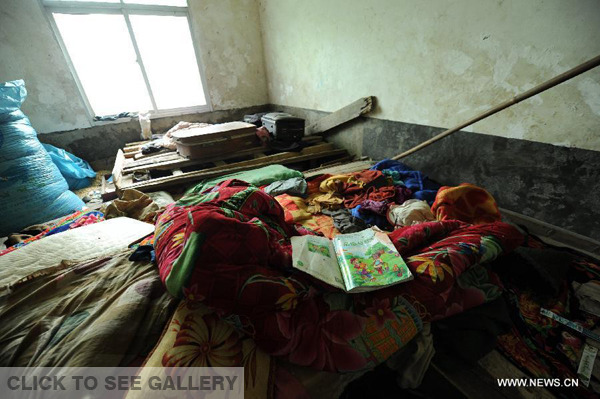The deaths of four children from one family have once again exposed the plight of a vast number of poor children without parental care in China.
Four siblings aged between 5 and 13 were hospitalized and later died after swallowing pesticide in the southwestern province of Guizhou on Tuesday, a police investigation confirmed.
Local authorities were unable to get in touch with the children's parents and it remains unclear whether they intended to kill themselves.
"The children did not lack food and clothes, but lacked the love and care of parents," said Xiao Wenying, a distant relative of the family. "The parents failed to fulfill their parental responsibilities."
The deaths have triggered widespread sympathy and anger.
Their mother, Ren Xifen, left home in March 2014 after a long and bitter dispute with her husband Zhang Fangqi who left the village in March this year, according to Gao Huacheng, the village Communist Party chief.
Caring for themselves, the siblings were living among 500 kg of stored corn and 25 kg of preserved meat in a three-story home.
Zhang's eldest son received money on a bank card his father gave him, police found. The local government has provided the family with minimum living allowance since 2012, and more than 3,500 yuan (about 560 U.S. dollars) was left on the bank card.
Pan Ling, another relative, said the family were socially withdrawn and often skipped class. The siblings' grandparents had all passed away.
The government of Bijie City's Qixingguan District, which administers the village, has started a survey of "left-behind" children and asked education officials, school principals and village heads to keep a close eye on the children to prevent similar tragedies.
China has more than 60 million children in rural areas who are left with relatives, usually grandparents. According to a 2013 report released by the All-China Women's Federation, nearly 3.4 percent of these children live alone.
The "left-behind" children fall easy victim to such tragedies, victims of trafficking and suicide.
In 2012, five street children also in Bijie died from carbon monoxide poisoning when burning charcoal for warmth in a roadside dumpster.
The issue of "left-behind" children in central and western China, like Guizhou, should get more attention from people in all walks of life, said Liu Chengbin, a professor of sociology at the Huazhong University of Science and Technology.
Some "left-behind" children get irritated easily, lack awareness of self protection and behavior control and cannot tell right from wrong, said Liu.
"Parents' love and care are very important to them and cannot be replaced," he said.
Liu said the authorities should push forward with reform to the household registration system to help children stay with their parents in cities.
China's one-child policy allows rural families and ethnic minorities to have more children than the urban norm.

















































